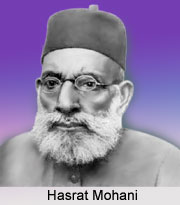 Maulana Hasrat Mohani was born in the year 1875 in the city of Lucknow in the Indian state of Uttar Pradesh. He was a Romantic Poet of Urdu language, journalist, politician, parliamentarian and a fearless freedom fighter of Indian Sub-continent.
Maulana Hasrat Mohani was born in the year 1875 in the city of Lucknow in the Indian state of Uttar Pradesh. He was a Romantic Poet of Urdu language, journalist, politician, parliamentarian and a fearless freedom fighter of Indian Sub-continent.
The real name of Maulana was Syed Fazl-ul-Hasan. Hasrat was his pen name which he used in the Urdu poetry. Similarly the word Mohani refers to the native place of Mohan where he was born.
Life of Maulana Hasrat Mohani
Real name of Hasrat Mohani was Syed Fazl-ul-Hasan. He was born in 1875 at Mohan (town) in the Unnao district of United Province in British India. Since he was a poet of Urdu language, he took the pen name of Hasrat Mohani in Urdu shayri.
Hasrat Mohani was not just a maverick when it came to publicly championing the radical thinking of Tilak. He also wrote verses expressing deep love for Lord Krishna, and often went to Mathura to celebrate Krishna Janmashtami.
Career of Maulana Hasrat Mohani
He was a brilliant and hardworking student as well as a topper in his first state level exams. Later, he studied in Aligarh Muslim University, where some of his colleagues were Maulana Mohammad Ali Jauhar and Maulana Shaukat Ali. His teachers in poetry were Tasleem Lucknawi and Naseem Dehlvi.
Academic Life of Maulana Hasrat Mohani
Few of his books are Kulliyat-e-Hasrat Mohani (Collection of Hasrat Mohani`s poetry), Sharh-e-Kalam-e-Ghalib (Explanation of Ghalib`s poetry), Nukaat-e-Sukhan (Important aspects of poetry), Mushahidaat-e-Zindaan (Observations in Prison) etc.
Political Life of Maulana Hasrat Mohani
In the year 1921 Ram Prasad Bismil attended Ahmedabad Congress along with many volunteers from Shahjahanpur and occupied a place on the dias. A senior congressman Prem Krishna Khanna and revolutionary Ashfaqulla Khan was also with him. Bismil played an active role in the Indian National Congress with Maulana Hasrat Mohani and got the most debated proposal of Poorna Swaraj passed in the General Body meeting of Congress. Mahatma Gandhi, who was not in the favour of this proposal, became quite helpless before the overwhelming demand of youths. It was another victory of Bismil against the Liberal Group of Congress. He returned to Shahjahanpur and mobilised the youths of United Province for non-cooperation with the Government. The people of Uttar Pradesh were so much influenced by the furious speeches and verses of Bismil that they became hostile against British Raj.
Struggle for Indian independence by Maulana Hasrat Mohani
Hasrat Mohani participated in the struggle for Indian Independence; and was jailed for many years by British authorities. He was the first person in Indian History who demanded `Complete Independence` (Azadi-e-Kaamil) in 1921 as he presided over an annual session of All India Muslim League. He was not only a practising Muslim but also a strong supporter of the communist philosophy, as he could see that the British could be defeated by following its principles.
Communist Movement by Maulana Hasrat Mohani
He was among the founders of the Communist Party of India. He was also imprisoned for promoting anti-British ideas, especially for publishing an article against British policies in Egypt, in his magazine `Urdu-e-Mualla`. Afterwards, unlike some Urdu poets like Josh Malihabadi and Nasir Kazmi, and many Muslim leaders, he chose to live in India rather than move to Pakistan after independence (1947).
Maulana Hasrat Mohani died on 13 May 1951 in Lucknow.













